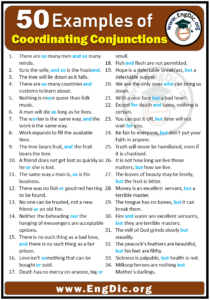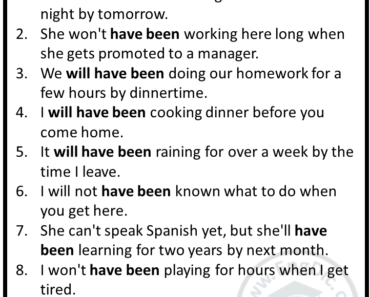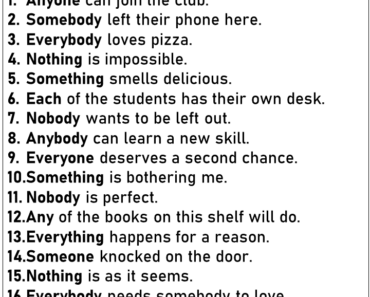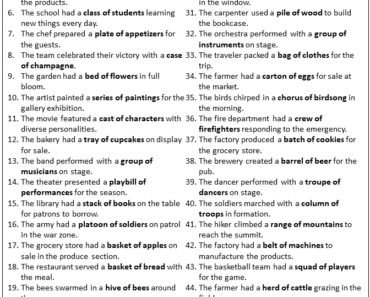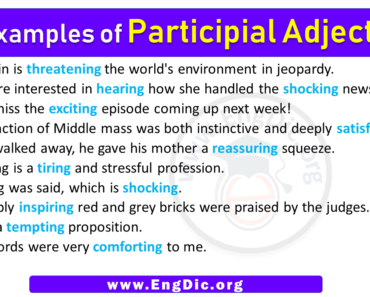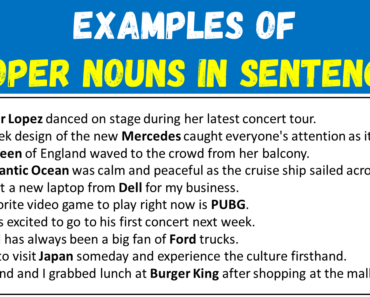Coordinating conjunctions are an integral part of any language and play a significant role in constructing sentences. They are used to combine two words, phrases, and clauses. This article will provide 50 examples of coordinating conjunctions in sentences to help you better understand their use and purpose. With clear examples, you will be able to recognize the importance of coordinating conjunctions within written English.
What is a Coordinating Conjunction?
A coordinating conjunction is a type of conjunction that is used to join words, phrases, or independent clauses of equal syntactic importance. It connects words, phrases, or clauses that have similar grammatical structures, and it shows that they are equal in importance and weight. The most common coordinating conjunctions are “and,” “but,” “or,” “nor,” “for,” “yet,” and “so.”
Coordinating conjunctions are used to form compound sentences by joining two or more independent clauses.
For example, “I went to the store, but I forgot to buy bread.”
In this sentence, “but” is the coordinating conjunction that joins two independent clauses of equal importance.
Coordinating conjunctions can also join words or phrases of equal syntactic importance.
For example, “She wants cake and ice cream for dessert.”
Overall, coordinating conjunctions play an important role in creating clear, concise, and well-structured sentences by joining related ideas and helping to create a logical flow of information.
Coordinate Conjunction vs Conjunctive Adverb! What’s the Difference?
Both coordinating conjunctions and conjunctive adverbs are used to join clauses, but there are some important differences between them.
A coordinating conjunction is a word that joins two or more independent clauses or words of equal importance. The most common coordinating conjunctions are “and,” “but,” “or,” “nor,” “for,” “yet,” and “so.” These words are used to join related ideas in a sentence, but they do not modify the meaning of the clauses themselves. Rather, they simply indicate a relationship between them.
On the other hand, a conjunctive adverb is a word that connects two independent clauses and shows the relationship between them. Common conjunctive adverbs include “however,” “moreover,” “nevertheless,” “therefore,” and “thus.” Unlike coordinating conjunctions, conjunctive adverbs modify the meaning of the clauses they join, indicating things like contrast, cause and effect, or time.
Another important difference between coordinating conjunctions and conjunctive adverbs is their placement in a sentence. Coordinating conjunctions typically appear between two clauses, while conjunctive adverbs can appear at the beginning, middle, or end of a clause. Additionally, when a conjunctive adverb is used to join two clauses, it is usually preceded by a semicolon and followed by a comma.
50 Examples of Coordinating Conjunctions in Sentences
- I want to eat pizza, but I’m trying to eat healthier.
- She is talented and hardworking.
- We can go to the beach or stay home and watch a movie.
- The store is closed now so we’ll have to come back later.
- He didn’t study for the exam yet he still passed.
- I like to go running for exercise and to clear my mind.
- She’s not only smart but also funny.
- They can come to the party as long as they behave.
- I enjoy reading books but I also like to watch TV.
- I can’t decide whether to get the chicken or the fish.
- She had a headache so she took some medicine.
- I like to eat fruit and vegetables for a healthy diet.
- He is a great singer yet he doesn’t perform often.
- You can have a blue shirt or the red one.
- He needs to finish his homework before he can play video games.
- We will go to the concert and then grab some dinner.
- She wants to go shopping but she doesn’t have any money.
- He was tired so he went to bed early.
- I like to listen to music while I work.
- You can go to the gym or go for a run outside.
- I’m not sure if I want to study abroad or stay at home.
- We can have chicken for dinner or we can make pasta.
- He didn’t have any cash so he used his credit card.
- She can dance as well as sing.
- I want to get a dog but my apartment doesn’t allow pets.
- We can watch a movie or play board games.
- He is tall yet he is also very graceful.
- You can take the bus or ride your bike to work.
- She didn’t feel well so she stayed home.
- I like to go on hikes and explore new trails.
- He’s not only a great athlete but also a good student.
- They can go to the amusement park as soon as they finish their chores.
- I prefer to read books rather than watch TV.
- I can either get a latte or a cappuccino.
- He missed the train but he still made it to the meeting on time.
- I like to exercise in the morning before I start my day.
- She can speak Spanish as well as English.
- We can go to the park or stay indoors and play games.
- He didn’t have enough time so he had to cancel his plans.
- I like to eat chocolate but I know it’s not good for me.
- You can have the window seat or the aisle seat.
- He was sick so he had to miss work.
- I like to watch movies while I eat popcorn.
- You can either drive or take the train to get to the city.
- She didn’t want to go to the party yet she felt obligated to attend.
- We can have ice cream or cake for dessert.
- I can study for the test or go to the movies with my friends.
- She is not only beautiful but also intelligent.
- We can go on a hike or go to the beach for the day.
- He is a great athlete as well as a talented musician.
Related:
- 20 Examples of Coordinating Conjunctions
- 15 Examples of Coordinating Conjunctions
- 10 Examples of Coordinating Conjunctions
- 5 Examples of Coordinating Conjunctions
